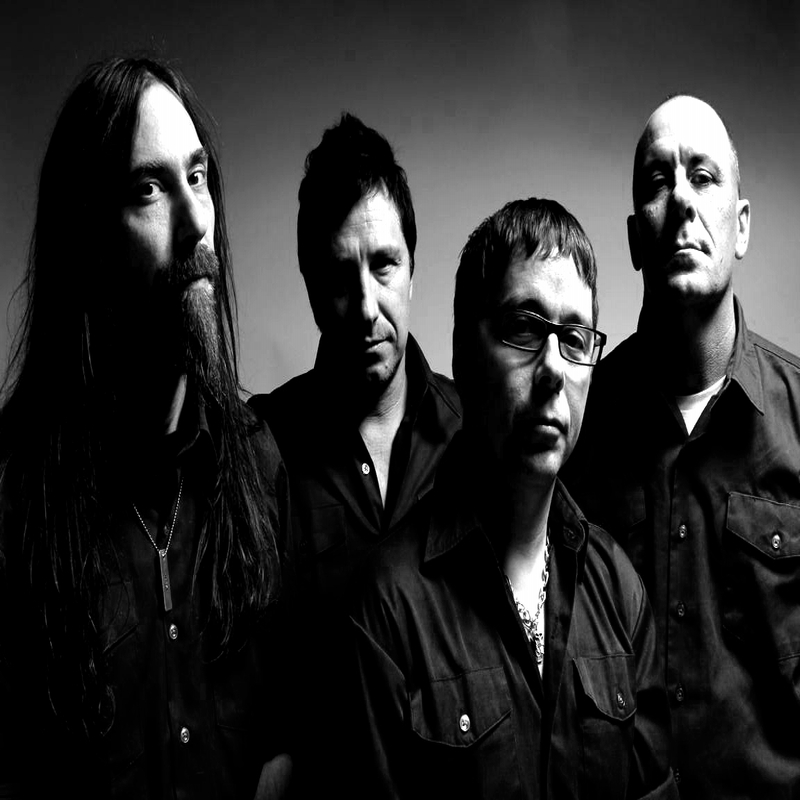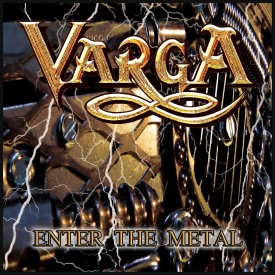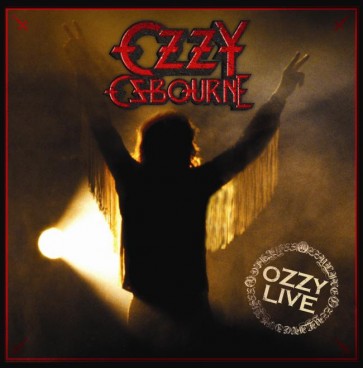Varga does well returning to its roots

During the 1990s, Canadian-based band Varga had been called everything from Industrial metal and groove metal to nu metal. But since Varga reunited in 2011, the band has returned to its traditional heavy metal roots.
All the members (Joe Varga on bass and vocals, Dan Fila on drums, Sean Williamson on guitar, and Adam Alex on guitar) went on to try various projects when Varga was put on hold entering the new millennium. The last studio album in the ’90s, Oxygen, was not well-received, so when the band came back together, the goal was to release a dynamic comeback release. And Varga believe they have done just that with last year’s Enter The Metal.
Sean Williamson (guitar) answers some Powerline questions below:
Is it true that the band reconnected through social media?
Sean Williamson: Yeah. Joe, Dan, and I had been playing in a classic-metal cover band called SuperBlaster for a few years, with some friends, just for fun and a reason to hang out, play shows, and drink. None of us had really heard from Adam in a long time. Eventually we all caved and got on Facebook, then one day Adam shows up on there.
What was the reason for the band’s break up?
Williamson: Well, it was never really an official break-up. It just wasn’t fun anymore. Felt to me like we were forcing things, and were more or less just burned out. The whole metal scene was basically dead at that time — venues were closing, labels weren’t interested, nothing was happening. So we decided to take a break. We had been going non-stop for years. I guess the longer we were apart, the easier it was to stay apart.
Did you think the album Oxygen should have been better received than it was?
Williamson: No, not really.
How do you feel the metal scene has changed since the band formed in 1989?
Williamson: It more or less disappeared in North America for a long time, but it’s back, more unified than ever, and on a global scale. There’s so many amazing bands out there, and they have their shit together. We’ve all been saying since forever, that metal will never die, that it comes and goes in popularity, but will always be there. That’s as true now as it was in 1989.
Do you think the Canadian metal scene is much different than the U.S.?
Williamson: I’d like to think that there’s not much difference. We have a ton of unreal metal bands here that can stand-up to anything out there, and Canadian metal fans are as devoted and smart as anybody. But overall the scene is still just starting to come back. It’s very much still an underground thing here. Canada is such a huge country, with such a small population, so it’s hard for bands to get out there and play all the time, build up a base, and expand the scene. The fact that Annihilator can play at Wacken, yet won’t draw in a small club at home pretty much says it all.
The band was once nominated for a Canadian Juno award for “best hard rock act.” That says a lot about the strength of the band, no?
Williamson: Industry awards are pretty meaningless to me. I walked out of that show after about ten minutes, and went to the bar down the street. I mean, if these award shows were based on something tangible like sales, or votes from the fans, that would be one thing, but who knows what the criteria is for these things. Did the label just buy a lot of seats for the show? It’s a nice honor, and validates the band to a point, but yeah, whatever.
How did being on Beavis and Butthead help the band?
Williamson: That’s hard for me say because I never actually saw the clip until years later. I always thought it was a bullshit rumor. But now I see a lot of comments from people saying that they remember us from the show, so it probably did a lot more for us than I was aware of.
Individually the band members went in different directions after the band’s breakup. Do you think that helped things when the band finally got back together?
Williamson: Absolutely. You continue to grow as a player, and being apart makes things fresh when you get back together. Truth is, I think we’re playing better now than we ever did.
How do you feel the new material compares to the old?
Williamson: Varga has always been a live band, tight and technical, above all else. The new material really captures that. The older material was approached with a more so-called ‘songwriting’ mentality, whereas the new stuff is just us throwing out all the rules, and playing our asses off. We don’t care what the rules are anymore, there’s no major label looking over our shoulder. We just want to play for ourselves, challenge each other musically, and crush the tunes live.
You say you hear a return to your metal and progressive roots. Which kind of influences? Can you explain?
Williamson: Sure, we’re back to playing the type of music that inspired us in the first place. NWOBHM and Bay Area thrash. Lots of double-kick, fast down-picking, ripping solos, just flat-out intense pounding old-school metal. It’s the music we grew up on, it’s the music we listen to, and it’s the best music to jam-out to.
 What did producer Julius “Juice” Butty bring to the new Varga sound?
What did producer Julius “Juice” Butty bring to the new Varga sound?
Williamson: We’ve been friends with Juice forever. We used to go see each other’s bands play, do shows together, hang out and play Sega hockey, get wasted. Juice would sing at SuperBlaster shows, and was in Hypodust with me and Dan. He’s a brother to us, plain and simple. I think it was his idea as much as ours to do the record together. He gets it totally. The guy is amazing in the studio. One of the hardest things to do in a studio is capture the true vibe of a band. It’s real tempting to try and fix every tiny detail in a computer, sample all the sounds, make it perfect. That’s cool if it’s what you’re going for, but Juice knew that Varga’s true chemistry is when we all play together as a band, and somehow how he managed to capture that human element. The guy is just awesome and the best singer I’ve ever seen.
How does the band feel playing together on stage again? Did you miss a beat?
Williamson: Not at all. If anything, I think we’re better now than we ever were, and we get better with each show. We’re not songwriters, we’re not artists. Varga is a live band. Adam and I crank up the amps, Dan pounds the fuck out of his drums, and Joe plays bass and sings for dear life. That’s the only reason we ever wanted to do this in the first place.
What will the next material sound like?
Williamson: It’ll totally be more of the same. This is what we are at our core. We’ve experimented with different approaches in the past, and take a certain amount of pride in everything we’ve done before, but we’re not about maximizing sales or fitting into mainstream radio formats. We’re not trying to be the most extreme, brutal, angry, tortured band out there either. That’s just not Varga. We’re four self-taught guys, who enjoy ripping it out together. Sometimes we will be jamming, and I’ll look over at Joe playing bass, and just be blown away and laugh. Or Fila will go into some drum part, and my jaw drops. No offense, Adam, but I can’t hear you from my side of the room.
Can fans feel confident that the band will remain together now?
Williamson: I see no reason why we can’t keep it going this time. All the things that caused us to split up in the first place, are no longer a factor. Bands can do what they want, when they want, how they want, and still get it out there. You don’t have to give up any control of anything if you don’t want to. We might eventually experiment with some different stuff, just because it’s fun to fuck around in the studio. Maybe release it as a side project, under a different name. Who knows? It’s the Wild West out there. Everybody has a voice, and can be heard. But bands need real support from their fans. These guys put their heart and soul into the music, and ripping it off from some off-shore torrent site only hurts the musicians. Go to their websites and buy it legit. That’s the only way they can afford to hit the road and get out there in front of the people that really matter. The fans. And when you buy it, just make sure you listen really damn loud. On real speakers!


Leave a comment